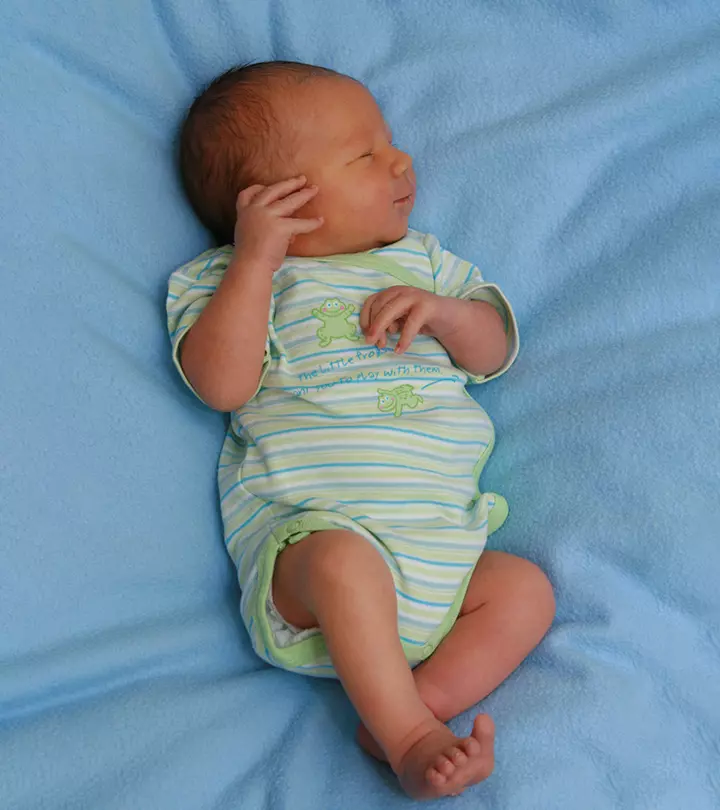
Image: iStock
We often take refuge in our favorite music to de-stress and relax. Good music seems to heal, soothe emotions and help in the mood regulation. But, have you ever thought about what impact listening to music during pregnancy can have on the growing baby? Scientists have been working to understand how music can affect a developing fetus but have yet to reach a definite conclusion. However, music therapy can be one of the great relaxation techniques and brighten you up, and you never know your baby inside may be enjoying it too. This post will tell you more about the effects music may have on the baby growing in your womb.
Key Pointers
- Music exposure in the womb enhances mental, behavioral, and emotional development of unborn babies.
- Listening to music during pregnancy creates a bond between mother and baby and has a positive impact on development.
- Music improves a baby’s reflexes, auditory senses, and overall personality.
- To avoid overstimulation, listen to music on headphones or place them on the belly for short periods throughout the day.
- Be aware of the type of music being played, as the baby’s breathing responds to the sounds and beats.
Music And Your Pregnancy: Is There A Connect?
While your baby is in your womb, there is a lot that is going on inside to support its overall growth and developmental process. All the experiences that your unborn baby will go through now will shape its future in the outside world.
Studies To Show The Effect Of Music On Your Unborn Baby

Image: IStock
Medical experts have carried out various studies on pregnant women to find out the effects of music on the unborn babies. According to the results, unborn babies who were exposed to music while in the womb showed a significant improvement in their overall mental, cognizant, behavioral, sensory, psychological and emotional development as compared to those who were not exposed to any music while they were in the womb.
A study was carried out to check the effects of Indian classical music, specifically the Kalyani raga, on pregnant women. For the study, the women were asked to listen to Carnatic music of Kalyani raga for at least 20 minutes each day for 20 days. After those 20 days, researchers did a test to see if there were any changes in the fetal responses and other developmental parameters. They noted that the prenatal music did have a significant influence on both the unborn baby as well as on the pregnant woman. From improving the unborn baby’s reflexes, responses, movement, mental and sensory stimulation, it also had a calming and positive effect on the pregnant woman.. [1]
What Are The Benefits Of Listening To Music During Pregnancy?
While you are pregnant, listening to music will not only have a soothing and uplifting effect on you but also a positive influence on your unborn baby. The positive vibes that you get from listening to music will create a prenatal stimulation that will help you to bond with your unborn baby. It will enable you to lower your stress and anxiety levels and also reduce any stress that your unborn baby may feel in the womb. Overall, studies have shown that listening to enjoyable music has a favorable effect that can act as a stimulant to improve cognitive function. This indicates that the Mozart effect results from a complicated interaction between music, arousal, and cerebral performance.
 Point to consider
Point to considerHere are some of the effects that listening to music can have on your unborn baby
- Will Improve Your Unborn Baby’s Reflexes: When you are listening to music while pregnant, your unborn baby will be able to hear the vibrations and will start reacting to the same. Your baby may also try to move in sync with the beats of the vibration and the corresponding audio stimulation. This may improve your unborn baby’s reflexes and reactions, and also its overall movement.
- Will Improve Your Unborn Baby’s Auditory Senses: As you listen to music with headphones, it will significantly enhance your unborn baby’s concentration, auditory senses, and skills. Your unborn baby may not be able to understand music at this stage, and what reach your baby are most likely the vibrations from sound waves. However, the baby will still try to concentrate on sounds, and doing so will better its mental stimulation.

Image: Shutterstock
- Will Act As A Soothing Lullaby After Birth: Many researchers believe that your unborn baby will be able to remember the music and the sounds that you listened to while you were pregnant. If you listen to certain soothing songs and lullabies while you are pregnant, it is highly likely that your baby will remember them even after birth. It means that you can use the same music to soothe your little one after it is born. Your baby will be able to recognize the sounds and it will help to relax and calm your baby instantly. This improves the parent-child bonding.
 Did you know?
Did you know?- Will Shape Your Baby’s Overall Personality: The type of music you listen to while you are pregnant can have an effect on the baby’s overall personality. If you listen to soothing sounds and soft music, your baby could develop a calm personality. On the other hand, if you listen to music that is loud and jarring, it could lead to an aggressive and anxious personality of your baby. However, there are no medical studies or research to back the same as experts are still working on the same.
How Can You Make Sure That Your Unborn Baby Is Listening To Music?

Image: IStock
Even though you may play a lot of music while you are pregnant, your unborn baby will not be able to listen to it the same way as you do. If you want to be certain that your baby hears the music from inside the womb, you can play it on your headphones and place the same on your belly.
Don’t play the music too loud just to ensure that your unborn baby can hear. Your placenta can carry the rhythms and beats to your baby even if you are playing something on a low volume.
How Much Music Should You Make Your Unborn Baby Listen To?
As with anything you do while you are pregnant, it is not a good idea to overdo the music part as well. If you want to play music in the background throughout the day, you can certainly do so on a loudspeaker at normal volume levels.
If you are planning to listen to music on your headphones or want to place the headphones directly on your abdomen, then make sure you do not do so for more than a couple of hours a day, spaced out in smaller bits and parts. This ensures that your unborn baby relaxes for some time instead of constantly reacting to the rhythms and beats.
Through constant exposure of your unborn baby to loud music, you may unknowingly disturb your baby’s natural sleep pattern. It is important for your baby to sleep well while in the womb, as it develops many mental, physical, psychological and other developments in sleep.
Do You Only Have To Listen To Soft Music While You Are Pregnant?

Image: IStock
Your musical preference depends largely on your personality and mood and what you are feeling at the moment. So it is not right to say that you should only listen to a particular type of music while you are pregnant.
In addition to listening to soft and soothing sounds and music, you can also listen to your favorite pop numbers. The beats from pop music have a certain rhythm and pattern to them, which your unborn baby will find easy to identify and remember.
Do remember that the way your baby breathes in your womb will also change according to the sounds and the beats that the baby hears. It means that if you are listening to very loud or jarring music, such as hard rock or very loud music, it can have an adverse impact on your unborn baby. It is fine if you are listening to such music for a short time but not for a longer stretch at a time, as the constantly shifting beats and rhythms from such music can actually cause stress to your unborn baby.
Should You Make Your Unborn Baby Listen To Classical Music?
Whether you should make your unborn baby listen to classical music is again a matter of your personal choice. While there is no medical data to support it yet, it is thought that making your unborn baby listen to classical music while still in the womb does have some positive effects. It is said that your baby will be able to appreciate the rhythms and sounds that emanate from classical music, and that the same can also help to soothe your little one after birth. As a result music can be of great help during prenatal classes.
However, the main aim here should be to form an emotional connect with your unborn baby, and not to try and turn your little one into a classical music genius, even before it is actually born.
Will Listening To Music Actually Make Your Unborn Baby Smarter?
The opinion on whether or not listening to music will make your unborn baby smarter is still under a lot of debate. While one camp believes that exposing your baby to music while still in the womb will definitely increase the level of its smartness, the other camp feels that there is no real truth behind that. There is also this widespread belief that if you expose your unborn baby to music while it is still in the womb, it will make your baby smarter in math. There is no medical study to back the claim, and the studies that do exist are all conducted on older children and not unborn babies.
For instance, there are medical studies that show that if you expose your child to piano lessons, it will help to improve the skills of spatial reasoning. However, these studies were also conducted on three and four-year-old kids and not on unborn babies. Carrying forward the same logic, some people do believe that exposing unborn babies to the sounds of a piano can have similar effects on them.
How Do You Know If The Music Is Too Loud?

Image: IStock
Exposing your unborn baby to very loud music is said to be risky as it could lead to premature birth and other adverse neonatal outcomes. It can also cause certain other health complications such as low weight at the time of birth, or hearing difficulties or high frequency hearing loss at the time of birth.
While it may sound scary, doctors raise an alarm only if you listen to very loud music on a regular basis, or if you are constantly in an environment where there are very loud noises. Exposing your unborn baby to loud noises or music on a few occasions, such as a rare visit to a rock concert, will not have the same effect as prolonged exposure to loud noises during pregnancy.
Here are some of the sound levels that you should keep in mind
- When you are listening to music on your player, make sure the volume is not higher than 65 decibels.
- If you feel you are going to listen to the music for a long duration of time, keep the volume at or below 50 decibels.
Frequently Asked Questions
1. When should I start playing music for my baby in the womb?
Babies may start hearing from 16 to 18 weeks of fetal development and may begin to respond by 24 weeks. They will be able to hear music by the third trimester. So you may play music to your little one early in the gestation period (3).
2. Does music help baby brain development?
Some animal studies indicate music can help fetal brain development (4). However, more research is needed to prove the same in human subjects.
3. Can playing music for the baby in the womb enhance their language development?
Yes, playing music for the baby in the womb can potentially enhance their language development, as music stimulates various areas of child development, including language acquisition and reading skills, which are crucial for school readiness (5).
4. Can the father’s voice be as effective as music when stimulating the baby in the womb?
Yes, the father’s voice can be as effective as music in stimulating the baby in the womb. Both music and the familiar voice of the father or caregiver create a calming atmosphere and can help soothe the baby and promote better sleep (5).
5. Can playing music during pregnancy help with bonding between the mother and the unborn baby?
Yes, playing soft and soothing music during pregnancy can help enhance the bond between the mother and the unborn baby by creating a calm atmosphere, slowing down the heartbeat, promoting deeper breathing, and familiarizing the baby with the mother’s voice and rhythm (5).
6. Does playing music for the unborn baby impact their sleep patterns after birth?
Playing music for the unborn baby has a beneficial effect on their sleep patterns once they are born. It comforts and calms them, slows their heart rate, and establishes a peaceful environment that promotes better sleep (5).
Music helps you relax and feel positive. Maternal stress or anxiety may have an adverse effect on the developing pregnancy. Music can help you de-stress and therefore have a healthier pregnancy. Research has already established the positive effects of music on the physical and mental growth and cognitive development of the fetus. But, it is best to avoid excessive or extremely loud music. Listening to soothing music during pregnancy can help you easily bond with your baby.
Infographic: Effects Of Listening To Music On Your Unborn Baby
Do you love listening to music? You can continue enjoying music during pregnancy as long as it is at a normal volume. If music is your escape from the overwhelming pregnancy emotions, find out how it helps your baby. Illustration: Momjunction Design Team
Illustration: Wonderful Effects Of Listening To Music During Pregnancy

Image: Stable Diffusion/MomJunction Design Team
References
- Deepthi Krishna; (2013); Influence of kalyani raga on fetus and pregnant women.
https://www.ncbi.nlm.nih.gov/pmc/articles/PMC4147484/ - Listening to music during pregnancy: Myths and facts.
https://www.ifwip.org/music-pregnancy-fetal-hearing-relaxation-stress-wellbeing/ - How music affects your baby’s brain: Mini Parenting Master Class.
https://www.unicef.org/parenting/child-development/how-music-affects-your-babys-brain-class# - Yuantian Zhang et al.; (2022); Prenatal Exposure to Classical Music Improves Learning and Memory in Adult Rats: Possible Anxiolytic or Antistress Effects.
https://psycnet.apa.org/fulltext/2022-24188-001.html - How music affects your baby’s brain: Mini Parenting Master Class
https://www.unicef.org/parenting/child-development/how-music-affects-your-babys-brain-class
Community Experiences
Join the conversation and become a part of our nurturing community! Share your stories, experiences, and insights to connect with fellow parents.
Read full bio of Kay Lakka
Read full bio of shreeja pillai
Read full bio of Rebecca Malachi
Read full bio of Dr. Joyani Das

















